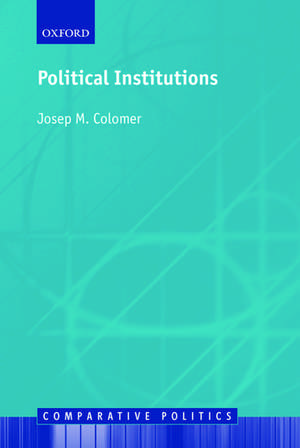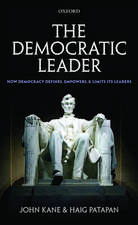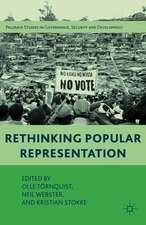Political Institutions: Democracy and Social Choice: Comparative Politics
Autor Josep M. Colomeren Limba Engleză Paperback – 6 mar 2003
Din seria Comparative Politics
- 30%
 Preț: 603.00 lei
Preț: 603.00 lei - 28%
 Preț: 436.87 lei
Preț: 436.87 lei - 24%
 Preț: 473.94 lei
Preț: 473.94 lei - 30%
 Preț: 724.31 lei
Preț: 724.31 lei - 17%
 Preț: 582.93 lei
Preț: 582.93 lei - 25%
 Preț: 556.87 lei
Preț: 556.87 lei - 19%
 Preț: 498.20 lei
Preț: 498.20 lei - 25%
 Preț: 689.93 lei
Preț: 689.93 lei - 19%
 Preț: 498.53 lei
Preț: 498.53 lei - 17%
 Preț: 860.24 lei
Preț: 860.24 lei - 27%
 Preț: 439.51 lei
Preț: 439.51 lei - 26%
 Preț: 545.40 lei
Preț: 545.40 lei - 19%
 Preț: 498.46 lei
Preț: 498.46 lei - 30%
 Preț: 503.13 lei
Preț: 503.13 lei - 13%
 Preț: 674.77 lei
Preț: 674.77 lei - 30%
 Preț: 595.93 lei
Preț: 595.93 lei - 30%
 Preț: 499.88 lei
Preț: 499.88 lei - 30%
 Preț: 593.78 lei
Preț: 593.78 lei - 19%
 Preț: 498.63 lei
Preț: 498.63 lei - 26%
 Preț: 557.24 lei
Preț: 557.24 lei - 30%
 Preț: 533.72 lei
Preț: 533.72 lei - 30%
 Preț: 597.63 lei
Preț: 597.63 lei - 34%
 Preț: 1110.21 lei
Preț: 1110.21 lei -
 Preț: 353.78 lei
Preț: 353.78 lei - 26%
 Preț: 773.47 lei
Preț: 773.47 lei - 27%
 Preț: 504.34 lei
Preț: 504.34 lei - 8%
 Preț: 305.80 lei
Preț: 305.80 lei - 18%
 Preț: 294.28 lei
Preț: 294.28 lei - 18%
 Preț: 294.00 lei
Preț: 294.00 lei - 31%
 Preț: 497.83 lei
Preț: 497.83 lei - 27%
 Preț: 330.46 lei
Preț: 330.46 lei - 18%
 Preț: 357.58 lei
Preț: 357.58 lei - 34%
 Preț: 937.56 lei
Preț: 937.56 lei - 18%
 Preț: 294.47 lei
Preț: 294.47 lei - 24%
 Preț: 487.78 lei
Preț: 487.78 lei - 14%
 Preț: 370.57 lei
Preț: 370.57 lei - 33%
 Preț: 606.32 lei
Preț: 606.32 lei - 20%
 Preț: 229.07 lei
Preț: 229.07 lei - 34%
 Preț: 1040.51 lei
Preț: 1040.51 lei - 30%
 Preț: 617.04 lei
Preț: 617.04 lei - 31%
 Preț: 467.50 lei
Preț: 467.50 lei - 22%
 Preț: 532.39 lei
Preț: 532.39 lei - 22%
 Preț: 730.85 lei
Preț: 730.85 lei
Preț: 344.75 lei
Preț vechi: 475.73 lei
-28% Nou
Puncte Express: 517
Preț estimativ în valută:
65.97€ • 68.87$ • 54.60£
65.97€ • 68.87$ • 54.60£
Carte tipărită la comandă
Livrare economică 24-31 martie
Preluare comenzi: 021 569.72.76
Specificații
ISBN-13: 9780199241842
ISBN-10: 0199241848
Pagini: 266
Ilustrații: numerous figures and tables
Dimensiuni: 156 x 235 x 15 mm
Greutate: 0.4 kg
Editura: OUP OXFORD
Colecția OUP Oxford
Seria Comparative Politics
Locul publicării:Oxford, United Kingdom
ISBN-10: 0199241848
Pagini: 266
Ilustrații: numerous figures and tables
Dimensiuni: 156 x 235 x 15 mm
Greutate: 0.4 kg
Editura: OUP OXFORD
Colecția OUP Oxford
Seria Comparative Politics
Locul publicării:Oxford, United Kingdom
Recenzii
Review from previous edition 'Political Institutions' is an outstanding contribution to the growing literature challenging the conventional wisdom that majoritarian, concentrated-power democracy provides the most 'decisive' and effective government. Instead, as Colomer's logical and empirical analysis convincingly demonstrates, sharing power and dividing power are much more advantageous. A first-rate scholarly achievement!
Josep Colomer has produced a rigorous, accessible analysis of social choice in democratic settings. Its empirical scope is broad, its emphasis on institutions is crisp, and its arguments are persuasive. 'Political Institutions' graces Oxford UP's new series on comparative politics.
A happy marriage of social choice theory with comparative politics, well worth reading, and including on syllabi . One strength is the author's knack for supplying historical material that illustrates the relevance of social choice theory to the study of political institutions. In this sense, Colomer's book follows in the tradition of William H. Riker's 'Liberalism Against Populism' (1982), although 'Political Institutions' is empirically richer, and much more accessible to a non-technical audience Colomer does this so well, with such a keen sense for how the basic intuitions from social choice theory map onto real-world politics, that Political Institutions should become a staple of reading lists on positive political theory and comparative politics.
This book should attract a broad readership from different fields within political science...easily intelligible and thoroughly pleasant read.
Compulsory reading for every professional of the social sciences, of political activity or public sphere and of decision-making in any field of economic and social life.
A well framed, well constructed, well documented and well argued book.
The author's erudition, along with his masterful application of social choice theory, make this book compulsory reading for students of comparative politics and constitutional law.
Josep Colomer has produced a rigorous, accessible analysis of social choice in democratic settings. Its empirical scope is broad, its emphasis on institutions is crisp, and its arguments are persuasive. 'Political Institutions' graces Oxford UP's new series on comparative politics.
A happy marriage of social choice theory with comparative politics, well worth reading, and including on syllabi . One strength is the author's knack for supplying historical material that illustrates the relevance of social choice theory to the study of political institutions. In this sense, Colomer's book follows in the tradition of William H. Riker's 'Liberalism Against Populism' (1982), although 'Political Institutions' is empirically richer, and much more accessible to a non-technical audience Colomer does this so well, with such a keen sense for how the basic intuitions from social choice theory map onto real-world politics, that Political Institutions should become a staple of reading lists on positive political theory and comparative politics.
This book should attract a broad readership from different fields within political science...easily intelligible and thoroughly pleasant read.
Compulsory reading for every professional of the social sciences, of political activity or public sphere and of decision-making in any field of economic and social life.
A well framed, well constructed, well documented and well argued book.
The author's erudition, along with his masterful application of social choice theory, make this book compulsory reading for students of comparative politics and constitutional law.
Notă biografică
Professor of Political Science and Economics at the Higher Council of Scientific Research and the Pompeu Fabra University, Barcelona



















